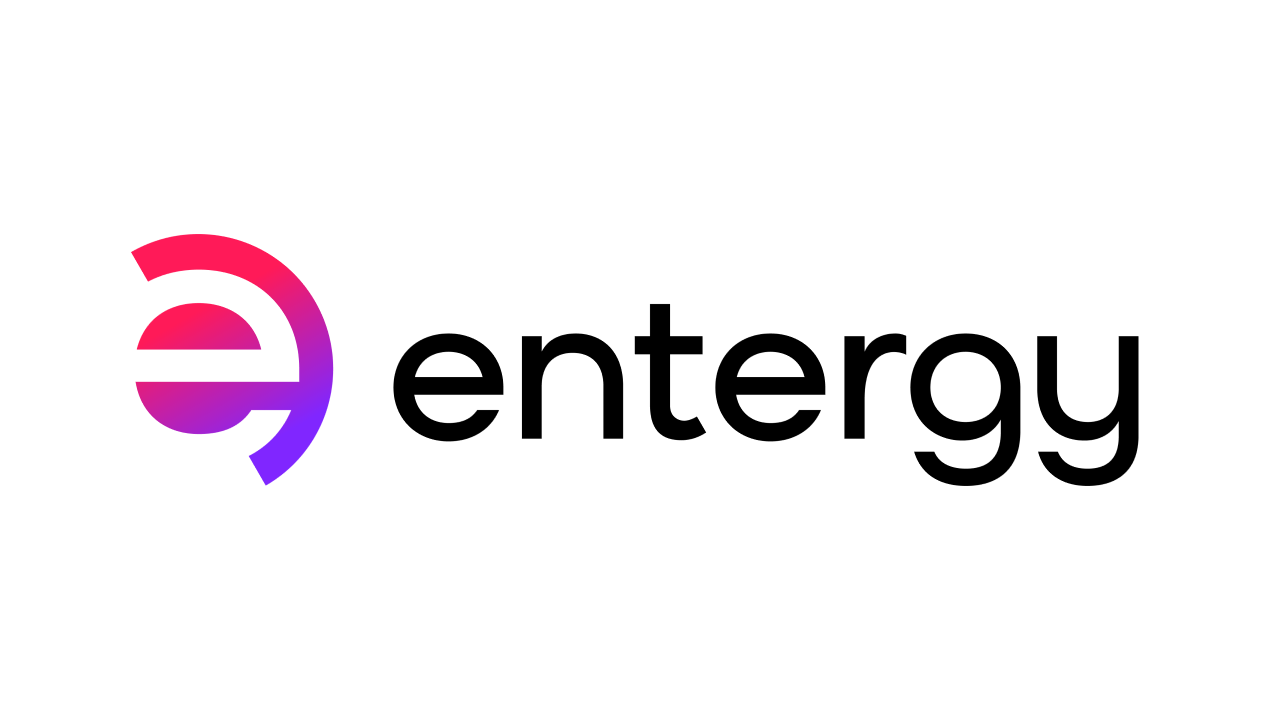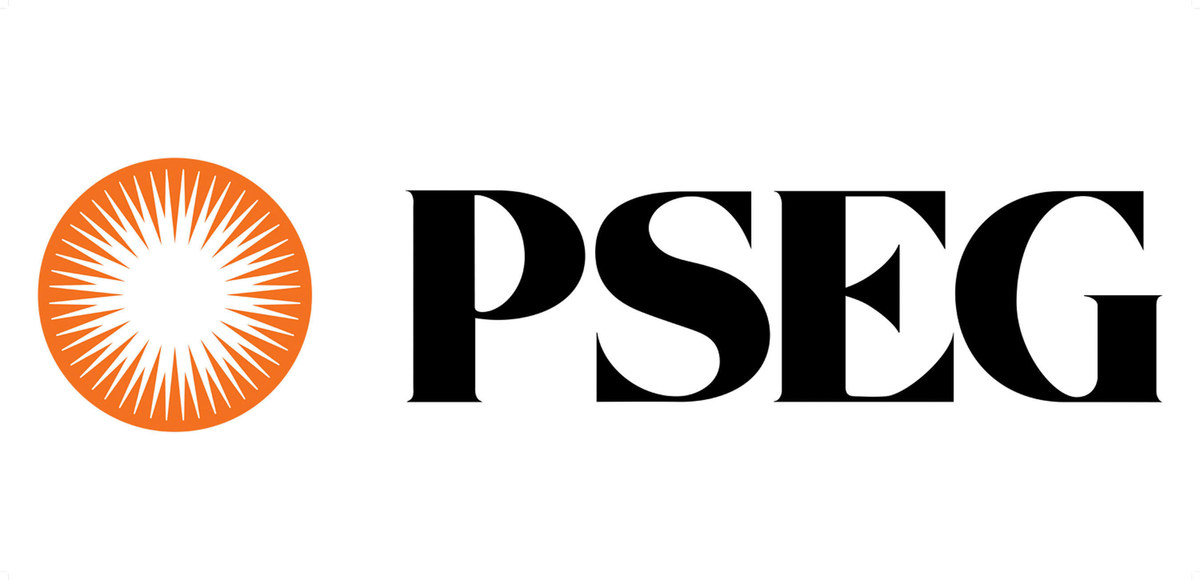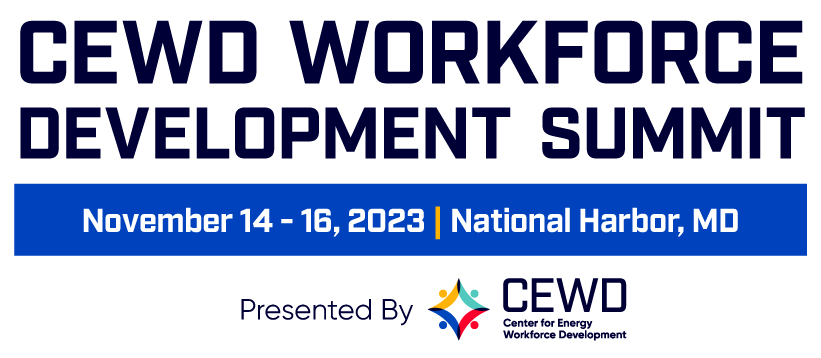
2023 SCHEDULE
Legend
- Diversity, Equity, and Inclusion Track
- Education and Training
- Community Engagement and the Future of Work Track
Monday, November 13
4:00 – 6:00 PM
Your Title Goes Here
Your content goes here. Edit or remove this text inline or in the module Content settings. You can also style every aspect of this content in the module Design settings and even apply custom CSS to this text in the module Advanced settings.
State Energy Workforce Consortia Meeting
The consortia gathering is a highlight of each annual Summit as it offers the ultimate in solutioning across state lines. This year’s meeting will again unite State Energy Workforce Consortia for information sharing, and it will also include a facilitated dialogue about how state groups may consider strengthening their engagement with state workforce policy agendas.
6:30 – 8:30 PM
Your Title Goes Here
Your content goes here. Edit or remove this text inline or in the module Content settings. You can also style every aspect of this content in the module Design settings and even apply custom CSS to this text in the module Advanced settings.
State Energy Workforce Consortia Dinner
Consortia representatives are invited to network with peers from around the country around topics of importance in strengthening statewide workforce development strategies. RSVPs will be collected in October. (This dinner is non-hosted.)
Tuesday, November 14
8:30 AM – 12:00 PM
CEWD Board of Directors Meeting
*Invitation Only
10:00 AM – 12:00 PM
Pre-Conference Programming
Your Title Goes Here
Your content goes here. Edit or remove this text inline or in the module Content settings. You can also style every aspect of this content in the module Design settings and even apply custom CSS to this text in the module Advanced settings.
Workforce Planning Educational Session: Embedding into Workforce Planning the Impact of Energy Trends on Workforce Development
Embedding into Workforce Planning the Impact of Energy Trends on Workforce Development. Workforce planning can no longer be managed in the industry as it always has been. Strategic workforce planning must become a company wide priority in order for contractors and utilities to ensure they are prepared for the ever-changing needs in people planning. This session will use best-in-class practices to demonstrate how energy businesses should be planning for their workforce needs to ensure their teams are properly considering retirements, trends that are here to stay with attrition, community demographics, low unemployment rates, etc. in preparation for a decarbonizing industry. Participants will learn how industry leaders have made workforce planning cultures as important as safety cultures within their businesses so they can systemically and innovatively plan for the future.
Workforce Development Bootcamp
This session is for those who are new to workforce development responsibilities, those who want to better understand the broad structure of workforce development, and those who may need a refresher in this often complex space. By definition, workforce development focuses on closing the skills gap by preparing and placing individuals in high-demand jobs in industries of priority. The energy sector is a key player in this important work, and accordingly, it is critical companies understand how to engage with workforce development boards, how to capitalize on sector partnerships, and connect most meaningfully with educators, particularly those within technical schools and career and technical education systems. Most especially, energy companies need to understand how to follow federal workforce development funding into their communities to find support for training, upskilling, and people placement.
Early Arrivers Learning Lab
Last year’s inaugural Learning Labs were so popular, we are bringing them back again! The Learning Labs will kickstart the Summit experience for attendees by offering an array of educational stations focused on a variety of workforce development topics. They really are learning and networking at their best.
12:00 PM – 1:00 PM
Lunch on Own
1:00 – 2:30 PM
Your Title Goes Here
Your content goes here. Edit or remove this text inline or in the module Content settings. You can also style every aspect of this content in the module Design settings and even apply custom CSS to this text in the module Advanced settings.
Opening General Session: The State of the Energy Workforce
Our opening general session will set the stage for the Summit experience and the industry’s workforce development priorities by looking at the State of the Energy Workforce. We will begin with a thorough understanding of our current workforce, based on data from CEWD’s Energy Workforce Report, presented by ScottMadden. We will look at the composition of the workforce, expected retirements and attrition, and a host of other datapoints that set the table for where we stand today. We will then hear from DOE’s Director of Energy Jobs to explore what the industry should be preparing for to ensure readiness for the industry’s future career paths and finally, we will look at the economics of the industry’s employment needs – how many jobs will we really need to hire for and what skill sets will these individuals really need.
2:30 PM – 3:15 PM
Your Title Goes Here
Your content goes here. Edit or remove this text inline or in the module Content settings. You can also style every aspect of this content in the module Design settings and even apply custom CSS to this text in the module Advanced settings.
General Session: Shifting Perspectives of the Changing Workforce
Companies continue to look for the secret sauce – the mystery ingredient to attract the best talent to make their workforce more competitive. This session, led by Jane Oates, President of Working Nation – and highly sought after spokesperson on how the industry can solve its workforce challenges – will provide fodder for the industry’s “to do” list – that is, what we must do to revolutionize attracting and retaining essential talent to fulfill the sector’s talent needs. WorkingNation, recognizes a working nation is a healthy nation, and they are helping America rethink what it means to be people-ready by telling stories and promoting conversations about solutions that can lead to a thriving middle class.
3:15 – 3:45 PM
Coffee Break Sponsored by Mears

3:45 – 4:45 PM
Your Title Goes Here
Your content goes here. Edit or remove this text inline or in the module Content settings. You can also style every aspect of this content in the module Design settings and even apply custom CSS to this text in the module Advanced settings.
General Session: Generative AI and Workforce Strategy
Generative AI promises to reshape dramatically the labor force. The scope of its impact will exceed that of any technological innovation of the last century. It will affect virtually every position in every industry, with particularly profound impact for white collar workers. In this session, Harvard Business School Professor Joe Fuller will discuss the implications of generative AI for companies and how utilities should prepare for an AI-powered economy.
4:45 – 5:30 PM
Your Title Goes Here
Your content goes here. Edit or remove this text inline or in the module Content settings. You can also style every aspect of this content in the module Design settings and even apply custom CSS to this text in the module Advanced settings.
General Session: From the C-Suite: Key Changes in How We Are Managing Workforce Development Priorities
This session will transport conference attendees into C-suites across the country as we engage in conversations with CHROs about how and why workforce development has taken more of a center stage in their organizations. We will ask them about the big conversations that are taking place. For instance, what are they talking about regarding using AI in workforce development; exploring untapped talent, preparing people for roles in a decarbonizing workforce; partnerships between utilities and contractors to support and sustain talent needs; seizing grant funding to support training and other priorities…and the list goes on. In short, we will find out how they are “doing workforce development differently” than they did a year ago, or even a few months ago.
5:30 – 7:00 PM
Your Title Goes Here
Your content goes here. Edit or remove this text inline or in the module Content settings. You can also style every aspect of this content in the module Design settings and even apply custom CSS to this text in the module Advanced settings.
Welcome Reception
Pack your hair spray! Summit attendees will gather for a night of 80’s-filled fun at the POSE Lounge, with disco balls, arcade games, neon lights, and glow-in-the-dark accessories, we’ll travel back in time together for a can’t-miss night.
7:30 – 9:30 P.M.
Your Title Goes Here
Your content goes here. Edit or remove this text inline or in the module Content settings. You can also style every aspect of this content in the module Design settings and even apply custom CSS to this text in the module Advanced settings.
Optional Event: Dine-Around Dinners
The dine-around dinners offer Summit attendees the chance to check out some of the area’s unique dining spots. They are perfect for those traveling alone eager to expand their network as well as people interested in continuing the day’s conversations in fun, relaxed environments. Individuals will be responsible for their own meal costs.
Wednesday, November 15
8:00 – 9:30 AM
Workforce Development Executive Council Meeting
*Invitation Only
8:00 – 9:00 AM
Your Title Goes Here
Your content goes here. Edit or remove this text inline or in the module Content settings. You can also style every aspect of this content in the module Design settings and even apply custom CSS to this text in the module Advanced settings.
Skills to Scale: How to find and train the workforce to drive our energy transition
What will it take to train 80,000 electricians and 80,000 clean energy technicians every year for the next decade? How will $9B in federal Home Energy Rebates supercharge the home energy improvement contractor market and put pressure on scarce talent? How might educators partner with industry to create talent pipelines that will feed in-demand and surging job growth? Accenture’s Danielle Verna will unpack will provide a tour of clean energy trends, workforce development needs, in-demand climate tech roles, and recommendations for how to partner for scale to meet the moment. She’ll also discuss a major new national green jobs program launched by Accenture, Goodwill, and General Motors to meet the moment.
Military Recruiters Breakfast
Military recruiters share the need to raise the visibility of energy careers to transitioning servicemen and women, Veterans, and military spouses. That objective is getting increasingly difficult as businesses across the country compete for talent in a tight labor market. Those involved in military recruiting are encouraged to join us for this informal networking session to share what’s working and what’s not.
9:00 AM – 9:45 AM
Your Title Goes Here
Your content goes here. Edit or remove this text inline or in the module Content settings. You can also style every aspect of this content in the module Design settings and even apply custom CSS to this text in the module Advanced settings.
Intertwining Workforce Development Throughout Operations, HR, and Beyond
Your Title Goes Here
Your content goes here. Edit or remove this text inline or in the module Content settings. You can also style every aspect of this content in the module Design settings and even apply custom CSS to this text in the module Advanced settings.
Girl Talk: Attracting and Retaining More Women in the Skilled Trades
This topic is so popular we brought it back to the Summit for the second year in a row! Last year, we heard from tradeswomen who shared perspectives of what needs to be done to attract and retain more women in the trades. This year, we will build on that foundational conversation hearing more about what female labor leaders need you to hear. We will also shine a light on some of the newer programs energy companies and their union partners have launched to open the door to more women recognizing opportunities for their talents within the industry.
Your Title Goes Here
Your content goes here. Edit or remove this text inline or in the module Content settings. You can also style every aspect of this content in the module Design settings and even apply custom CSS to this text in the module Advanced settings.
Step by Step Guide to Bringing Energy Industry Fundamentals 2.0 into your School or Business Classroom
Learn more from EIF 2.0 super users how to best implement the new, dynamic curriculum. The content is designed for secondary and post-secondary learners, but can also be embedded in incumbent worker training, especially new employee orientation. Also, learn how the end of course certificate can be utilized as an industry recognized, stackable credential. As an increasing number of educators look to offer energy education in the classroom, learn how to make EIF 2.0 their go-to curriculum of choice.
10:00 AM – 10:45 AM
Your Title Goes Here
Your content goes here. Edit or remove this text inline or in the module Content settings. You can also style every aspect of this content in the module Design settings and even apply custom CSS to this text in the module Advanced settings.
Idea Lab: Modernizing and Accelerating Industry Training
In today’s rapidly evolving world, learning modernization has emerged as a critical imperative for the energy industry. The sector faces many challenges, ranging from shifting market dynamics to workforce and technology availability. To stay competitive and relevant, energy companies must adopt a forward-thinking approach that prioritizes continuous learning and upskilling. By leveraging modern learning techniques and technologies, such as virtual simulations, augmented reality training, personalized learning paths and proficiency advancement, the industry can empower its workforce to adapt swiftly to emerging trends and innovations. Moreover, fostering a culture of lifelong learning will enable professionals to tackle complex problems, optimize operations, and drive enhanced operational performance. Embracing learning modernization in the energy industry will not only boost productivity and cost-effectiveness, but also insulate companies during the impending global energy transition. This session will explore innovative strategies and best practices for implementing learning modernization to harness the full potential of the industry’s remarkable employees, while surmounting the unique challenges of the business.
Your Title Goes Here
Your content goes here. Edit or remove this text inline or in the module Content settings. You can also style every aspect of this content in the module Design settings and even apply custom CSS to this text in the module Advanced settings.
Creating an Energy Skill Bridge Program/Internship for Veterans
The Department of Defense (DOD) invests tens of thousands of dollars in training service members. Their formal training is supplemented by extensive on-the-job training and accumulated hands-on experience, ensuring these highly trained, highly effective Veterans are a sought-after part of talent needs within many businesses. DOD’s SkillBridge program has helped many companies tap into this talent pool; however, the Department recently revamped this program, meaning new processes and practices for companies to learn. This session will review what employers need to focus on moving forward with the new SkillBridge program and speak to the realignment that occurred within DOD. Before adjourning, we will share a few lessons and words of advice from companies that have implemented SkillBridge internships and pre-apprenticeship programs.
Your Title Goes Here
Your content goes here. Edit or remove this text inline or in the module Content settings. You can also style every aspect of this content in the module Design settings and even apply custom CSS to this text in the module Advanced settings.
Effective Workforce Development Strategies in Small and Rural Communities
While there are basic tenants intrinsic to workforce development, implementation can look a little different in smaller urban and rural communities. What can be done to ensure a skilled, diverse workforce when there just aren’t enough people to go around? How can we change perspectives so people see the career potential within energy companies, and don’t depart for short-term or immediate gains? What partnerships with schools, workforce systems, and community based organizations are offering the most impactful returns? How do we work differently moving forward than we have in the past to ensure we are attracting and retaining the people we need? This session will showcase newer ways companies in small communities are addressing workforce challenges and then the students become the teachers when we go “open mic” for participants to share what’s working in their own communities.
11:00 AM – 12:00 PM
Your Title Goes Here
Your content goes here. Edit or remove this text inline or in the module Content settings. You can also style every aspect of this content in the module Design settings and even apply custom CSS to this text in the module Advanced settings.
We Created Registered Apprenticeship Programs and Here's What We Learned
Registered Apprenticeship Programs (RAPs) have gained increasing popularity within the industry. Often considered by many to be too complicated or restrictive, they have seen a surge in prominence as many federal funding opportunities require companies to have such programs in place and because increased market demand from individuals who want to advance their careers through earn and learn models are seeking apprenticed opportunities. This session will provide a platform for energy companies that have recently created a Department of Labor RAP to share information on their experiences related to development, implementation, registration, costs, and benefits. They will offer perspectives on utilizing existing federal funding to develop RAPs and share perspectives on “watch outs” on pitfalls to avoid.
Your Title Goes Here
Your content goes here. Edit or remove this text inline or in the module Content settings. You can also style every aspect of this content in the module Design settings and even apply custom CSS to this text in the module Advanced settings.
Creating Sector Partnerships That Support Career Pathways
This timely, interactive session will provide information on how demand industries in your local area and/or state can intersect with career pathways. It will take a look at some fundamental steps to kick off robust employer engagement to drive an informed approach to what business needs and expects from the workforce system partners. Attendees will prepare a template with the action steps needed back on the job to establish new sector partnership groups, tap into existing partnership groups convened by other entities, or to enhance sector work already being done by the local workforce board. Team attendance is encouraged so you can begin the collaborative process of melding workforce, education, and economic development strategies to go home with a blueprint for implementation or enhancement. You will get more from the session if you bring a laptop or share a laptop with others that allows for Internet access.
Your Title Goes Here
Your content goes here. Edit or remove this text inline or in the module Content settings. You can also style every aspect of this content in the module Design settings and even apply custom CSS to this text in the module Advanced settings.
The Results Are In: Findings from CEWD's 2023 Research on DE&I Policies and Practices within the Industry
The 2023 Energy Workforce Report collected DE&I data to better understand where the industry is in its DE&I journey. This session, led by ScottMadden and industry DE&I leaders, will begin with a look at the state of DE&I form two perspectives: 1) diversity by position within the workforce and 2) DE&I policies and practices currently in place within energy companies and expectations for change in the next few years. With the data in hand, the team will turn to interpretation of the results – what today’s positioning foreshadows for action and change and where companies should consider leaning in with more urgency on creating the structure for impactful DE&I change.
12:00 – 1:30 PM
Your Title Goes Here
Your content goes here. Edit or remove this text inline or in the module Content settings. You can also style every aspect of this content in the module Design settings and even apply custom CSS to this text in the module Advanced settings.
Lunch and General Session: The Energy Workforce Transition Tango
There are two transitions underway for utilities sector employees. The first is broadening the sources of talent and experience from which the sector hires as the utility workforce continues to grow. The second transition is the increased training to allow employees to work with new technologies and business models as the focus on emissions reduction in the economy heightens. In this session, a panel of Deloitte and industry leaders will discuss how to:
- Uncover differentiated skills and new sources of talent
- Develop creative training programs to upskill for career path opportunities
- Align decarbonization and workforce planning with the pace of technology and domestic supply chain development
1:45 PM – 2:45 PM
Your Title Goes Here
Your content goes here. Edit or remove this text inline or in the module Content settings. You can also style every aspect of this content in the module Design settings and even apply custom CSS to this text in the module Advanced settings.
How Do We Prepare and Train For Clean Energy Careers of the Future?
Preparing today’s workforce for careers associated with new and emerging areas of energy technology has become an increasingly urgent topic of conversation. The irony is, many of the jobs we need to prepare people for haven’t even been fully identified or developed yet. So what should we be thinking through now so we are fully prepared to meet the needs of the future. This session will offer perspectives from experts actively training in the areas of energy efficiency, cybersecurity, hydrogen, supply chain, solar, wind, battery storage, and advanced reactors. They will provide insights of where your attention should be focused now as you prepare your current workforce for all that is ahead.
Your Title Goes Here
Your content goes here. Edit or remove this text inline or in the module Content settings. You can also style every aspect of this content in the module Design settings and even apply custom CSS to this text in the module Advanced settings.
Developing Effective High School Readiness Programs
One of the biggest barriers to building a talent pipeline is the lack of awareness of energy careers, particularly by students. Without energy recognized as a career cluster in most states (42 at last count), students can’t readily learn about all the industry has to offer in school. Until we can have energy curriculum more accessibly integrated into schools, industry practitioners must think creatively about how to effectively partner with area educators. This session will feature panelists who have taken three different approaches to connect with high school students to prepare them for appropriate entry points into energy careers.
Your Title Goes Here
Your content goes here. Edit or remove this text inline or in the module Content settings. You can also style every aspect of this content in the module Design settings and even apply custom CSS to this text in the module Advanced settings.
Lessons Learned from the National Urban League Partnership
Hundreds of highly-trained workers from underrepresented populations are being connected with energy job opportunities through the Urban Energy Jobs program, a partnership between the National Urban League and the Center for Energy Workforce Development. These collaborations funnel the Urban League’s diverse pool of career-seekers from preparatory training and pre-apprenticeship programs to opportunities with energy companies across CEWD’s partnership network. This session will offer a look at what lessons have been learned so far from the first year of collaboration, such as what must be done to bring greater awareness of and trust with under-represented communities about energy careers, what types of training programs have been most successful, the role for stipends in training, and what actions must be taken to scale more connections between energy companies and Urban League affiliates.
3:00 PM – 4:00 PM
Your Title Goes Here
Your content goes here. Edit or remove this text inline or in the module Content settings. You can also style every aspect of this content in the module Design settings and even apply custom CSS to this text in the module Advanced settings.
CAST, CAST-R, and the Future of Pre-Employment Testing for Industry Skilled Trade Jobs
EEI’s Construction and Skilled Trades (CAST) test battery, which measures cognitive aptitudes important for the safe and successful performance of industry jobs such as lineworkers, electricians, and mechanics, was implemented in 1990 and has been an integral part of many electric companies’ hiring processes for over 30 years. While aptitude tests such as CAST are widely regarded as the most effective pre-employment test for skilled trade jobs, they also tend to produce differences in the average scores of various demographic subgroups, leading to differential hiring rates for diverse candidates. To help address this issue, EEI developed a revised version of the CAST test, CAST-R, that incorporates non-cognitive attributes and is designed to improve the diversity of candidates who pass the test. Several companies have been using CAST-R for the past couple years, with favorable results. In this session, we will provide a brief overview of the history of CAST test use in the industry, review what we’ve learned from the use of CAST-R, and discuss our next steps in creating a pre-employment testing solution for skilled trade jobs that will meet the industry’s needs for many years to come. We will engage the audience in the discussion of next steps, so if you have familiarity with industry skilled trade jobs, be sure to come prepared to share your expertise!
Your Title Goes Here
Your content goes here. Edit or remove this text inline or in the module Content settings. You can also style every aspect of this content in the module Design settings and even apply custom CSS to this text in the module Advanced settings.
New and Evolving Workforce Relationships Between Utilities and Contractors
Utilities and contractors have been long-standing partners, with contractors offering a supplemental workforce. However, some of these relationships are changing, particularly as utilities expand relationships with companies involved in new and emerging areas of energy technology. This session will explore how some of the relationships are transforming, particularly as there is such a dire need for people and many companies are being asked to provide new talent, for new jobs, creating new relationships. Together, we will explore the changing landscape to see where challenges have surfaced and how companies are navigating opportunities before them.
Your Title Goes Here
Your content goes here. Edit or remove this text inline or in the module Content settings. You can also style every aspect of this content in the module Design settings and even apply custom CSS to this text in the module Advanced settings.
Let's Have the Conversation: What's the Role for the Re-Entry Population in Energy?
In today’s tight labor market, companies are being forced to look at their people-needs differently to find untapped talent. Businesses that have long-considered hiring from the reentry population, those who have been incarcerated, have dusted off their pros and cons list, to explore whether they might now consider opening the doors to a new talent market by ushering those who have been in the prison system. The data proves hiring formerly incarcerated people brings a workforce with higher retention rates, increased productivity, lower turnover and more loyalty. In addition, tax credits are often available for hiring those who have been imprisoned. This session will review the process for training and certifying people in the criminal justice system to prepare them for reentry, address the benefits of second chance employment, and provide energy companies resources to hire and promote career advancement opportunities to people with criminal records.
4:00 – 4:15 PM
Coffee Break Sponsored by Mears

4:15 PM – 5:30 PM
Your Title Goes Here
Your content goes here. Edit or remove this text inline or in the module Content settings. You can also style every aspect of this content in the module Design settings and even apply custom CSS to this text in the module Advanced settings.
General Session: Mobilizing the Energy Sector For Effective Action in Workforce Development Public Policy
There has been a rapid intersectionality between public policy and workforce development. Energy companies must ensure now, more than ever before, they are engaged in advocacy efforts that will allow them to take advantage of federal, state, and local policies that can support funding for training, tax credits for programming, sector partnerships, apprenticeship programs, and a myriad of other priorities to effectively compete against other industries vying for similar resources. This session will provide an overview of CEWD’s new workforce development focused policy priorities and explain why and how the sector should be increasingly engaged in using its pollical capital on a workforce development agenda. We will also hear from DC-insiders who will showcase examples of how other industries have united to effectively secure political “wins” for their people needs and give ideas of where and how we can be more effective advocates for our needs.
7:30 P.M. – 9:30 P.M.
Your Title Goes Here
Your content goes here. Edit or remove this text inline or in the module Content settings. You can also style every aspect of this content in the module Design settings and even apply custom CSS to this text in the module Advanced settings.
Optional Event: Nighttime Social at Top Golf
Enjoy the evening working on your swing and chatting with colleagues – no golfing experience or hand-eye coordination required! The indoor, luxury, high-tech golf game will encourage attendees to get out of the hotel, relax, and socialize with your colleagues. Separate registration is required, limited space available.
Thursday, November 16
8:00 AM – 9:00 AM
Your Title Goes Here
Your content goes here. Edit or remove this text inline or in the module Content settings. You can also style every aspect of this content in the module Design settings and even apply custom CSS to this text in the module Advanced settings.
Round Table Discussions and Breakfast
Start your morning with conversation focused around workforce development topics that interest you most. There will be more than a dozen topics from which to choose. The most difficult part of the day may be whether to stay at one table for in-depth conversation or take in several different discussions.
9:00 AM – 9:50 AM
Your Title Goes Here
Your content goes here. Edit or remove this text inline or in the module Content settings. You can also style every aspect of this content in the module Design settings and even apply custom CSS to this text in the module Advanced settings.
General Session: Success Factors that Contribute to Significant, Quantifiable, Scalable, and Sustainable DE&I Impact
Global investment for DE&I-related efforts is projected to be $15.4 billion by 2026, more than double comparable investments made in 2020. Accordingly, greater clarity on what works—and what does not—can help leaders maximize the return on their effort and investments. McKinsey’s Diversity, Equity and Inclusion Lighthouses 2023 Report identified five success factors common across the DEI initiatives that yielded the most significant, scalable, quantifiable, and sustained impact for underrepresented groups. Join the session to learn more about these factors. The McKinsey team will also bring learnings from world-class organizations outside to energy sector to inspire thinking and facilitate interactive exercises to start architecting a plan to get started.
10:00 AM – 11:00 AM
Your Title Goes Here
Your content goes here. Edit or remove this text inline or in the module Content settings. You can also style every aspect of this content in the module Design settings and even apply custom CSS to this text in the module Advanced settings.
National Energy Literacy Survey
Results from the 2nd National Energy Literacy Survey of High School Seniors recently became available, and the results are not encouraging. Students’ energy-related knowledge, attitudes, and behaviors have all declined since the 1st Survey in 2017. What might this mean for energy workforce development efforts? What can utilities, government agencies, and other energy industry players do in response? Elissa Richards, President and CEO of the National Energy Foundation, which conducted the Survey, will share the results and suggest paths forward.
Your Title Goes Here
Your content goes here. Edit or remove this text inline or in the module Content settings. You can also style every aspect of this content in the module Design settings and even apply custom CSS to this text in the module Advanced settings.
Tips on Working with Community Based Organizations to Secure Grants for Training
With the infusion of grant funding now available to support the people part of the energy companies, it’s almost like the money tree is indeed growing on trees. Despite the readily available resources to prepare individuals for careers within the sector, there is still a pretty big mystery around effective strategies to secure such funding. This session will explore how to effectively partner with national and state organizations to be best positioned to secure grant funding to offset training costs for energy companies and strengthen partnerships to fuel your talent funnel.
Your Title Goes Here
Your content goes here. Edit or remove this text inline or in the module Content settings. You can also style every aspect of this content in the module Design settings and even apply custom CSS to this text in the module Advanced settings.
Why DE&I Begins with Company Culture
Developing a diverse talent pool and hiring a diverse workforce are important, but neither can be done effectively without ensuring an inclusive workplace culture. In fact, onboarding people from systemically marginalized communities who don’t feel welcome and included can do lasting damage to a company’s brand, present an image of tokenism, and inhibit progress with future workforce development initiatives. Despite this, 76% of individuals who participated in CEWD’s Listening Sessions indicated the lack of inclusion is a significant challenge in retaining diverse talent. It’s time for action! This session will identify, define, and detail inclusive behaviors for leaders and employees.
11:10 AM – 12:00 PM
Your Title Goes Here
Your content goes here. Edit or remove this text inline or in the module Content settings. You can also style every aspect of this content in the module Design settings and even apply custom CSS to this text in the module Advanced settings.
Upskilling Today's Workforce for Tomorrow: Transitioning from Operations to Technology
There has been an increasing emphasis on re-skilling and upskilling within the energy workforce, but what does this look like? What conversations and actions must take place now, so we are prepared to train today’s employees for tomorrow’s jobs? What skill sets will they need, particularly those of a digital nature? How can we more effectively cross-train people for the roles they will have in the next decade? This session will offer perspective on how companies are preparing now for significant changes to the skills required within the industry’s workforce and will invite audience participation so everyone walks away with a clear understanding of conversations that should be front and center corporate planning.
Your Title Goes Here
Your content goes here. Edit or remove this text inline or in the module Content settings. You can also style every aspect of this content in the module Design settings and even apply custom CSS to this text in the module Advanced settings.
Translating Military Skills to Civilian Energy Jobs
Recruiters and hiring managers without military experience may not understand the military, nor understand, how best to leverage the skills Veterans bring with them to enhance their places of employment. On the other side, Veterans may have a hard time with self-promotion, making it difficult for hiring managers to identify where a military applicant may best fit within an organization. During this session, military recruiters will share how they evaluate Veterans skills and how they translate those to essential skills needed in the industry.
Your Title Goes Here
Your content goes here. Edit or remove this text inline or in the module Content settings. You can also style every aspect of this content in the module Design settings and even apply custom CSS to this text in the module Advanced settings.
Reach for the STARS: Driving Equity in the Hiring Process
While businesses continue to lament a persistent talent shortage, many are overlooking millions of workers who are Skilled Through Alternative Routes (STARs) rather than a bachelor’s degree. Despite analysis that shows more than 30 million STARs have skills for significantly higher-wage work, employers routinely screen out STAR candidates in the pursuit of hiring efficiency.
Given the growing and immediate demand for a variety of jobs in the clean energy sector, business leaders have an unprecedented – and urgent – opportunity to reset the traditional workforce development and industry practices that continuously shut out STARs from viable career pathways. And with STARs comprising 61% of Black workers, 55% of Hispanic workers, 48% of women workers, 66% of rural workers, 61% of veteran workers, and 31% of AAPI workers (alongside 53% of White workers) in the U.S., it’s clear that any workforce strategy centered on equity must be one that is also centered on STARs. This discussion will explore the necessary changes that will unlock the potential of 70+ million skilled workers across the country — and build a stronger and more resilient energy industry.
12:15 – 1:00 PM
Your Title Goes Here
Your content goes here. Edit or remove this text inline or in the module Content settings. You can also style every aspect of this content in the module Design settings and even apply custom CSS to this text in the module Advanced settings.
Lunch and General Session: What Great Companies Do To Diversify Their Workforce and Drive a Culture of Inclusion
UnidosUS transforms the workforce ecosystem to ensure Latino workers have access to quality jobs and clear pathways to prosperity. Situated at the intersection of learning and work, the Burning Glass Institute advances data-driven research and insights to enable effective interventions deployed through partners to support underserved communities and stakeholders across the nation. This session will share the power of strategic partnerships, key stakeholders needed, and actions that can be taken, to effectively deploy inclusive talent management systems – behaviors, policies and practices – that support workers, employers and communities throughout the energy sector. As part of this discussion, the speakers will share key insights and take-aways from the Burning Glass Institute’s American Opportunity Index and UnidosUS’ programmatic efforts.
1:00 – 1:30 PM
Impact Awards
1:45 P.M. – 3:45 P.M.
Your Title Goes Here
Your content goes here. Edit or remove this text inline or in the module Content settings. You can also style every aspect of this content in the module Design settings and even apply custom CSS to this text in the module Advanced settings.
Working Session: Taking Action on Industry Developed Registered Apprenticeship Programs for Careers in New and Emerging Energy Technology
This working session will bring practitioners together to advance actions on developing industry created Registered Apprenticeship Programs for new and emerging areas of energy technology, some to be addressed in collaboration with the IBEW. Beginning in the early fall, there will be facilitated calls to address benefits of collaborative efforts, prioritization of which RAPs should be considered first, and initial conversations about career pathways, defined competencies, and required knowledge, skills, and abilities, allowing the in-person meeting to advance identified action.
Your Title Goes Here
Your content goes here. Edit or remove this text inline or in the module Content settings. You can also style every aspect of this content in the module Design settings and even apply custom CSS to this text in the module Advanced settings.
Working Session: Creating an Energy Technician Associate Degree
This session is open to those interested in exploring the creation of curriculum that could be made available nationwide to help students earn an energy technician associate degree.
The program is subject to change.
Section times are listed in Eastern Time, reflective of the meeting location.
Please contact [email protected] for information on Sponsorship opportunities.
2023 SUMMIT SPONSORS
PLATINUM
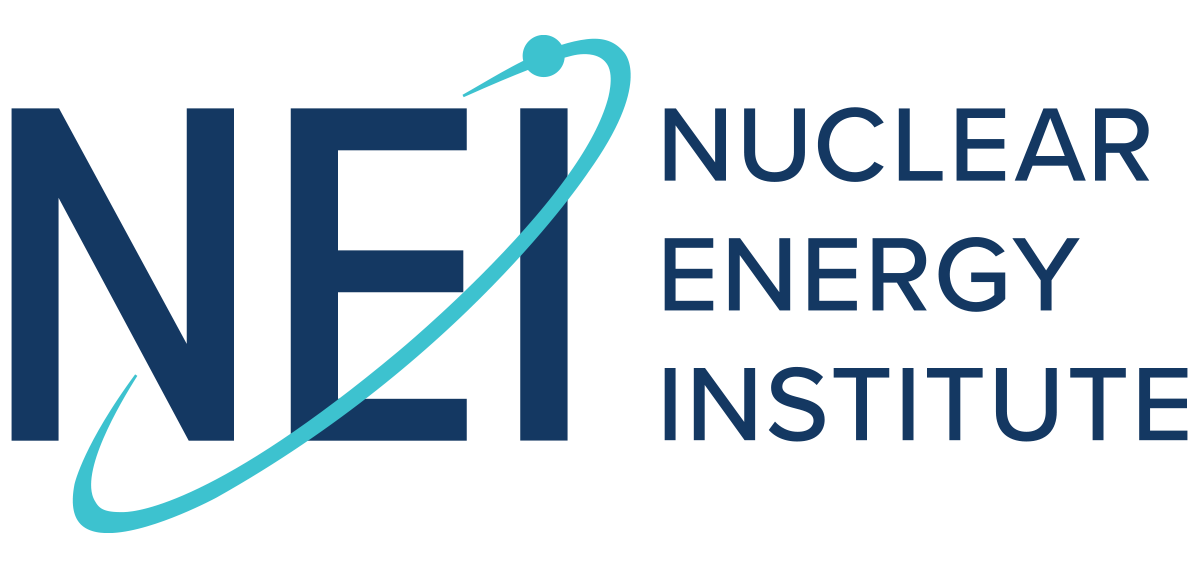
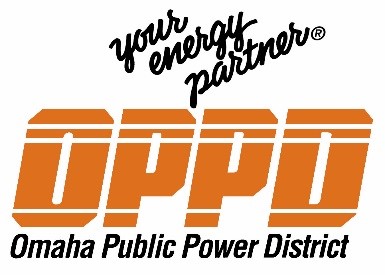
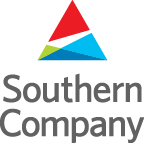
GOLD
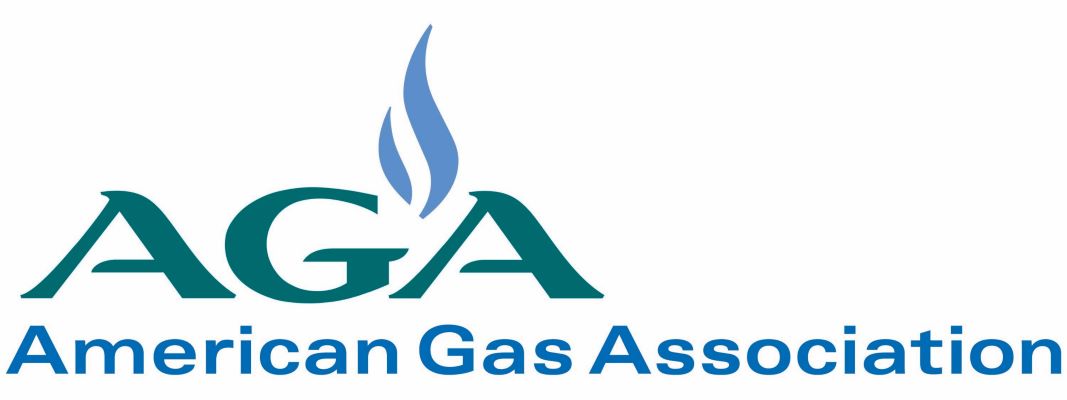
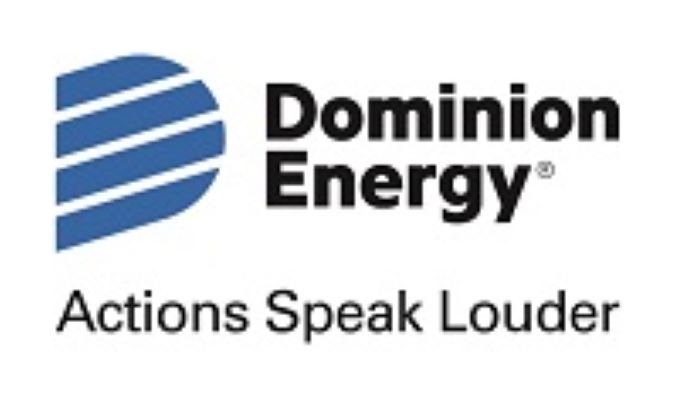
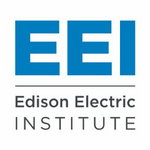
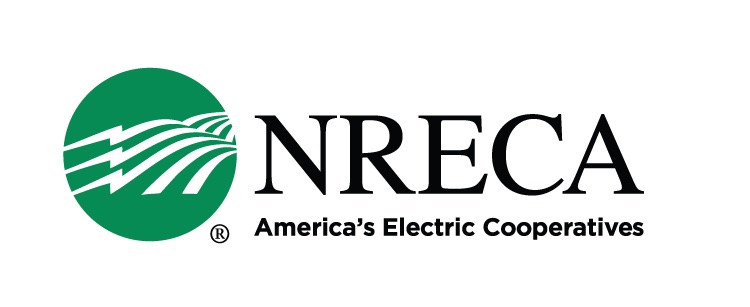
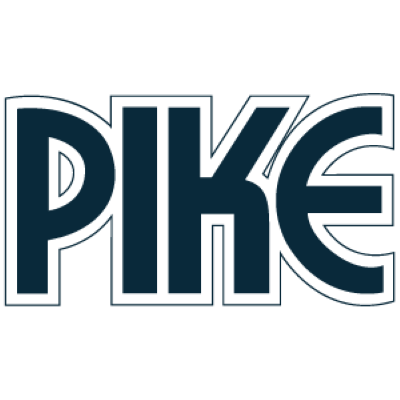
SILVER

